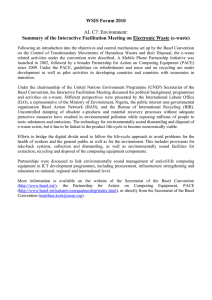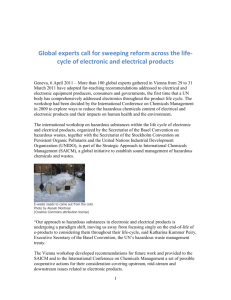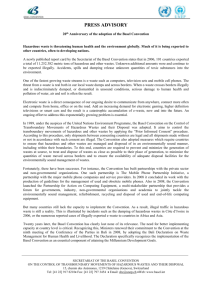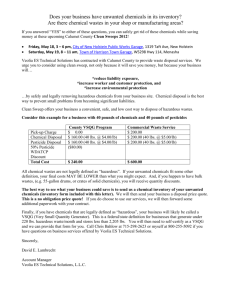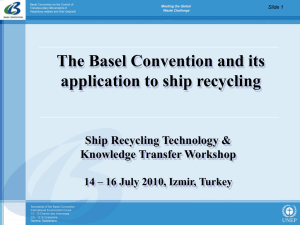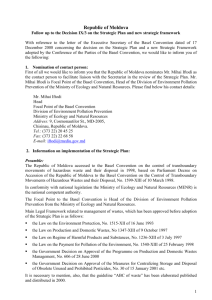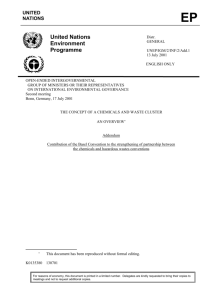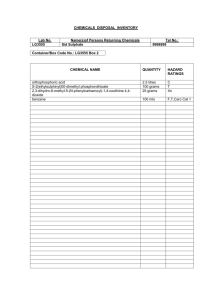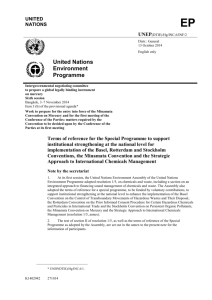Chair: Shawn Lau
advertisement
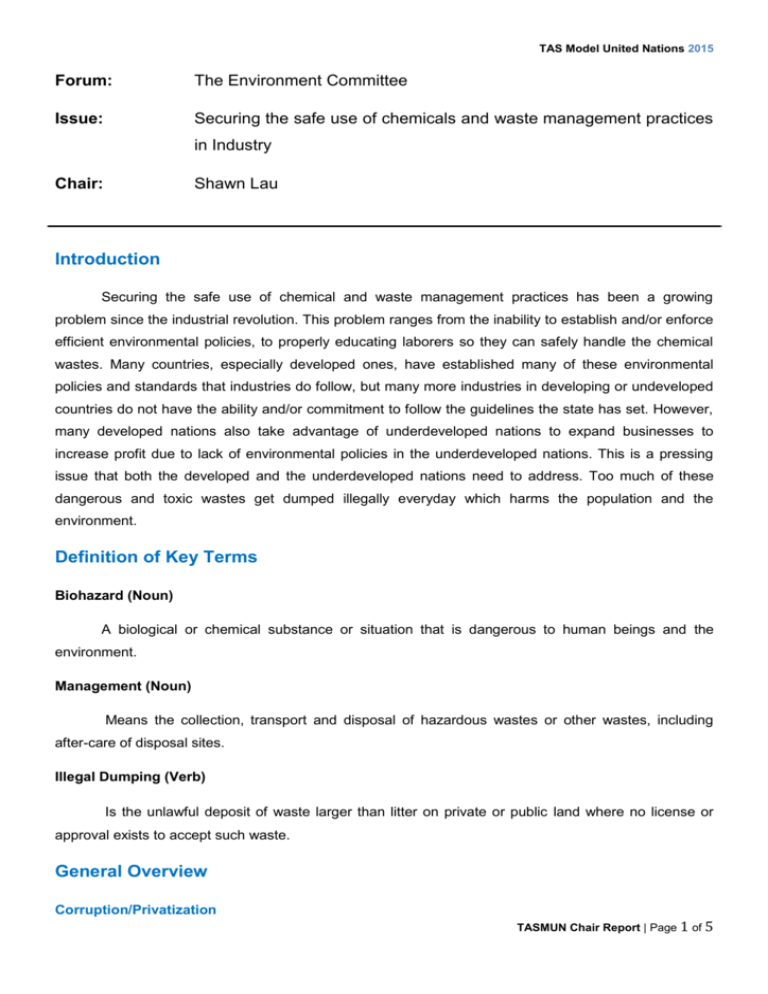
TAS Model United Nations 2015 Forum: The Environment Committee Issue: Securing the safe use of chemicals and waste management practices in Industry Chair: Shawn Lau Introduction Securing the safe use of chemical and waste management practices has been a growing problem since the industrial revolution. This problem ranges from the inability to establish and/or enforce efficient environmental policies, to properly educating laborers so they can safely handle the chemical wastes. Many countries, especially developed ones, have established many of these environmental policies and standards that industries do follow, but many more industries in developing or undeveloped countries do not have the ability and/or commitment to follow the guidelines the state has set. However, many developed nations also take advantage of underdeveloped nations to expand businesses to increase profit due to lack of environmental policies in the underdeveloped nations. This is a pressing issue that both the developed and the underdeveloped nations need to address. Too much of these dangerous and toxic wastes get dumped illegally everyday which harms the population and the environment. Definition of Key Terms Biohazard (Noun) A biological or chemical substance or situation that is dangerous to human beings and the environment. Management (Noun) Means the collection, transport and disposal of hazardous wastes or other wastes, including after-care of disposal sites. Illegal Dumping (Verb) Is the unlawful deposit of waste larger than litter on private or public land where no license or approval exists to accept such waste. General Overview Corruption/Privatization TASMUN Chair Report | Page 1 of 5 TAS Model United Nations 2015 Corruption is the primary obstacle to establishing better environmental policies in states. Many less economically developed countries value Gross Domestic Product (GDP, an indicator of economic growth) over environmental protection. Such countries have no short term incentives to improve their environment policies because they are more focused on expanding their economy. Also, many agencies and officials in such countries avoid cracking down on factories that violate these laws too hard as such actions would decrease employment opportunities. In fact, some countries even set unrealistic goals and policies to look more progressive in the eyes of the international community but in reality, no company or individual ever bothers to reach those goals in those countries. In developed nations, many companies have strong political ties that makes officials vote in favor of weaker environmental policies. The privatization of the waste industry has stunted opportunities for communities to become more ecofriendly by prioritizing profit over sustainability. Many businesses from more developed nations use criminal organizations to smuggle waste to less developed countries in order to save the money they would need to pay to properly dispose the waste. Developed Countries The privatization of waste industry has taken a toll on the progress to achieve greener societies. In America, large corporations like Casella Waste Industries and Waste Management dominate the waste market. They work hand in hand with waste industry officials to permit massive expansions of landfills and increase incineration waste tonnage to gain more profit. However, in many cases, simply recycling and reusing is more than sufficient. Undeveloped Countries Many countries prioritize their GDP over environmental protection, especially in the East and South East Asian regions. China is a notorious example where many officials take bribes or give light punishments instead of harsh ones to businesses and factories in order to maintain economic stability. Vietnam, Taiwan and South Korea have fallen victim to multiple cases of illegal waste smuggling by other countries and corporations which is against international law. Furthermore, because of these actions, people’s health are suffering from the increase in toxic chemicals in the environment Simply unknown It may be surprising to know that states sometimes simply cannot keep up with the speed at which companies use new types of chemicals and produce unknown wastes that both the companies and the state do not know how to handle. Handling methods go from purification, containment, long-term storage to incineration. Choosing the wrong handling methods could lead to dangerous chemicals being produced or placed in wrong areas that could poison waterways or the air that which could lead to bad health and other detrimental environmental effects. TASMUN Chair Report | Page 2 of 5 TAS Model United Nations 2015 Progressive development As in the issue with corruption, money seems to be valued the most highly. Most companies put profit over environment whenever possible. However, although sometimes companies do not intend to violate any laws, they still develop too quickly for the government, private institutes and universities to research the chemicals they use for their industry. This means that the government, private institutes and universities cannot predict the waste they are going to produce and thus cannot provide proper waste management mechanisms. Too much of the waste produce is unknown and is then disposed incorrectly even though companies may be willing to check them and dispose them through legal methods. This causes all sorts of problems in the drainage and disposal system, which poisons the soil and causes damage to both humans and the environment. Timeline of Events Date Description of event 22 March 1989 Basel Convention opened for signature 3-14 June 1992 United Nations Conference on Environment and Development (UNCED) 22 May 2001 Stockholm Convention 20-22 July 2012 Rio+20 summit UN Involvement, Relevant Resolutions, Treaties and Events In the past twenty-five years, the United Nations (UN) has gotten increasingly involved in this issue. After the United Nations Conference on Environment and Development in 1992, countries recognized the growing production of waste and its harm on the world as a pressing problem. However, there is still much to be done, because the UN cannot interfere with state policies directly. Therefore, the UN used multilateral agreements and conventions to expand and address this issue. The Basel Convention called for restriction of transportation/safe transportation of certain wastes globally while the Stockholm Convection called for eliminating the usage of persistent organic pollutants. Most resolutions/conventions listed down below sadly only call for the recognition of this growing issue and propose basic solutions like recycling, which is clearly not enough. ● The future we want (clause 213-233), 27 July 2012 (A/RES/66/288) ● Report of the Commission on sustainable development on its second session, 16-27 May 1994 (E/1994/33) ● Stockholm Convention, 22 May 2001 TASMUN Chair Report | Page 3 of 5 TAS Model United Nations 2015 ● Basel Convention, opened for signature on 22 March 1989, entered force on 5 May 1992 Possible Solutions There are many aspects to consider in solutions to this issue, ranging from cracking down on corruption in environment agencies in certain countries all the way to establishing better research institutes to research the properties of certain wastes and chemicals. As a national report put it, “chemical substances are being continuously manufactured and used despite the potential for inadequate technical knowledge on how to properly dispose of them.” If companies and countries can establish guidelines on testing certain substances before putting it to industrial and commercial use, the chance of producing an unknown toxic substance will be lowered. Also, the further mechanization of industries could help lower the total amount of industrial waste produced as it could reduce the chances of human error while saving companies profit. Another simple yet pressing problem is how to address the growing cost of disposal costs in all countries. Last but not least, creating motivating and creative ways for companies, countries, and organization to jointly fund developing research on how to dispose hazardous waste is also necessary for the world to solve this problem together. Bolded sources are especially helpful; go check them out! Bibliography Japan. Waste Management. United Nation, n.d. Web. <http://www.un.org/esa/dsd/dsd_aofw_ni/ni_pdfs/NationalReports/japan/Waste_Management.pdf >. "United Nations Official Document." UN News Center. UN, n.d. Web. 11 Jan. 2015. <http://www.un.org/ga/search/view_doc.asp?symbol=A%2FRES%2F66%2F288&Lang=E>. "The Problems with Waste." The Problems with Waste. N.p., n.d. Web. 17 Jan. 2015. <http://www.toxicsaction.org/problems-and-solutions/waste>. "Pollution Issues." Hazardous Waste. N.p., n.d. Web. 11 Jan. 2015. <http://www.pollutionissues.com/FoHi/Hazardous-Waste.html>. UNEP. Basel Convetion. By Texts And Annexe. Basel: n.p., 1989. Web. 12 Jan. 2015. <http://www.basel.int/Portals/4/Basel%20Convention/docs/text/BaselConventionText-e.pdf>. "EPA." Persistent Organic Pollutants: A Global Issue, A Global Response. N.p., n.d. Web. 16 Jan. 2015. <http://www2.epa.gov/international-cooperation/persistent-organic-pollutants-global-issue-globalresponse>. TASMUN Chair Report | Page 4 of 5 TAS Model United Nations 2015 Sigman, Hilary. "Midnight Dumping: Public Policies and Illegal Disposal of Used Oil." The RAND Journal of Economics 29.1 (1998): 157-78. Web. 19 Jan. 2015. TASMUN Chair Report | Page 5 of 5
